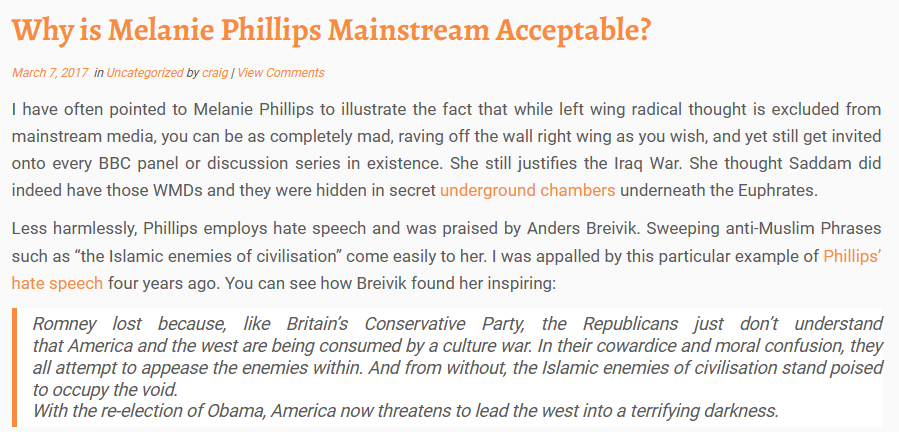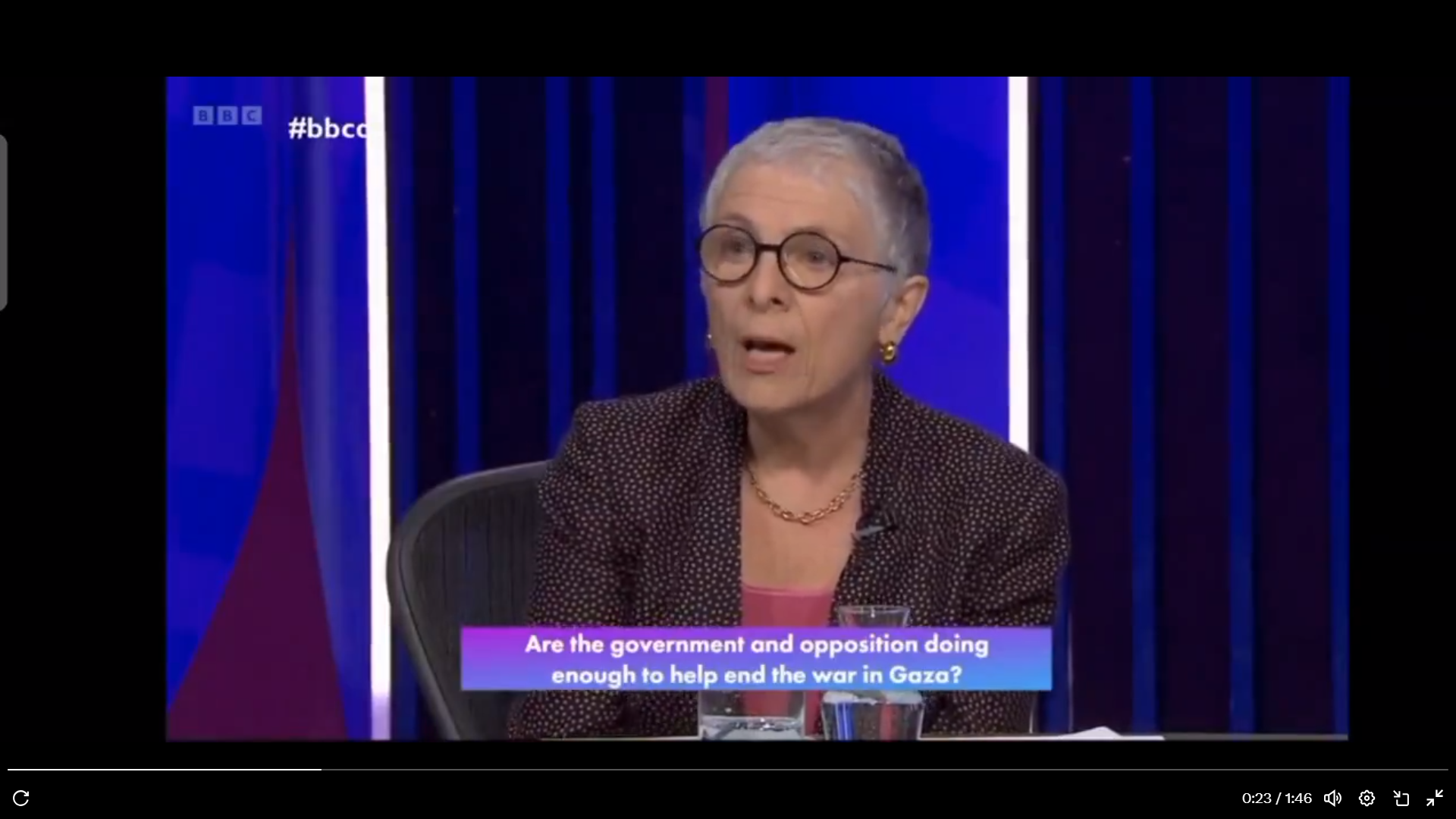Melanie Phillips was quoted by Anders Breivik before he went on a mass killing spree.
We all remember Anders Breivik
Anders Behring Breivik, a Norwegian far-right extremist, perpetrated one of the most devastating acts of terrorism in modern European history on July 22, 2011. His meticulously planned attacks targeted government buildings in Oslo and a youth camp on the island of Utøya, resulting in the deaths of 77 people and injuring hundreds more. Breivik’s actions shocked not only Norway but the entire world, prompting widespread condemnation and sparking debates about the rise of far-right extremism, terrorism, and security measures across Europe.
Breivik’s background and radicalisation provide crucial context to understand his actions. Born on February 13, 1979, in Oslo, Norway, Breivik grew up in a middle-class family. His parents divorced when he was young, and he lived primarily with his mother. Breivik’s childhood was reportedly troubled, marked by social isolation and conflicts with peers. He showed an interest in computers and entrepreneurship from an early age, but his path took a dark turn as he became increasingly influenced by far-right ideologies.
Breivik’s radicalisation can be traced back to the early 2000s, when he became involved with far-right online communities and extremist groups. He immersed himself in anti-immigrant, Islamophobic, and xenophobic ideologies, blaming multiculturalism and liberal policies for what he perceived as the decline of Western civilisation. Breivik’s writings, including his manifesto titled “2083: A European Declaration of Independence,” reveal a deeply held belief in the necessity of violence to achieve his goals of purging Europe of multiculturalism and establishing a new order based on conservative values.
The execution of Breivik’s plan began on July 22, 2011, with a bombing in the government quarter of Oslo. Disguised as a police officer, Breivik parked a van packed with explosives outside the office of the Prime Minister and other government buildings. The explosion, which occurred at 3:25 p.m., devastated the area, killing eight people, injuring many more, and causing extensive damage to nearby structures. The bombing was intended to strike at the heart of the Norwegian government and send a message of defiance against what Breivik saw as the liberal establishment.
Following the bombing, Breivik embarked on the second phase of his attack: a massacre at a youth camp on the island of Utøya. Disguised as a police officer and armed with firearms, including a semi-automatic rifle, Breivik travelled to the island, where a summer camp organised by the Norwegian Labour Party was taking place. Upon arrival, he gained access to the camp under the guise of conducting a security check in response to the Oslo bombing.
Once on the island, Breivik began indiscriminately shooting camp participants, most of whom were teenagers and young adults. The attack lasted for more than an hour, during which Breivik methodically hunted down and killed his victims, some of whom attempted to hide or flee into the water surrounding the island. The isolated location and limited means of escape made it difficult for survivors to seek help or evade the gunman. In total, Breivik murdered 69 people on Utøya and injured dozens more, leaving behind a scene of unimaginable horror and grief.
Breivik’s motives for targeting the youth camp on Utøya were rooted in his extreme right-wing ideology. He viewed the camp as a symbol of the progressive values and multiculturalism that he sought to eradicate from Norwegian society. Many of the camp participants were children of immigrants or from families with liberal political beliefs, making them prime targets in Breivik’s eyes. By attacking Utøya, Breivik aimed to strike fear into the hearts of those who supported multiculturalism and to demonstrate the supposed superiority of his own ideology through acts of violence.
Following his arrest, Breivik expressed no remorse for his actions and openly admitted to carrying out the attacks. During his trial, which began in April 2012, Breivik used the platform to espouse his extremist views and justify his crimes as necessary for the preservation of European culture and identity. Despite attempts by his defense team to portray him as mentally unstable, Breivik was found guilty of terrorism and mass murder in August 2012 and sentenced to the maximum penalty under Norwegian law: 21 years in prison with the possibility of indefinite extension.
The trial of Anders Breivik sparked intense debate in Norway and beyond about issues such as extremism, terrorism, immigration, and the criminal justice system’s response to such atrocities. Many questioned how Breivik could have been radicalised to the point of committing such heinous acts and what could be done to prevent similar incidents in the future. In the aftermath of the attacks, Norway implemented various measures to strengthen security, improve intelligence sharing, and address the root causes of extremism, including social integration and mental health support.
Breivik’s actions also had far-reaching implications for the far-right extremist movement in Europe. While he initially claimed to be part of a larger network of like-minded individuals, investigations revealed that he had acted alone in planning and executing the attacks. However, Breivik’s manifesto and online presence inspired others sympathetic to his cause, leading to concerns about the spread of extremist ideologies and the potential for copycat attacks. European countries intensified efforts to monitor and counter far-right extremism, recognising it as a significant threat to national security and social cohesion.
The legacy of Anders Breivik and his terrorist attacks continues to reverberate in Norway and around the world. Memorials have been erected to honour the victims, and anniversaries of the attacks serve as reminders of the need for vigilance against extremism and hatred. While Breivik may be behind bars, the ideologies that motivated him persist, underscoring the ongoing challenge of combating extremism and fostering inclusive societies built on tolerance, diversity, and respect for human rights.

And knowing all of this and the impact of Phillip’s dangerous rhetoric, apparently the BBC considers it a great idea to invite her onto one of their political programmes. However, to be fair, so now do anti Zionists.
I think we should see more of Melanie Phillips and people like her – they do much more damage to Zionism than I ever could https://t.co/3lXMDSIbYp
— Jackie Walker – HRH, MP, MBE, ABC (@Jackiew80333500) March 15, 2024
BTW Melanie, you may want to find other sources for your bollocks than Youtube videos.
Penny Lane
If you like our content, join us in helping to bring reality and decency back by SUBSCRIBING to our Youtube channel: https://www.youtube.com/channel/UCQ1Ll1ylCg8U19AhNl-NoTg AND SUPPORTING US where you can: Award Winning Independent Citizen Media Needs Your Help. PLEASE SUPPORT US FOR JUST £2 A MONTH https://dorseteye.com/donate/












